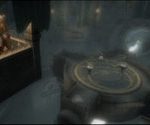On Itinerant
Teri Rueb
Teri Rueb describes Itinerant and quotes excerpts from the project's vocal track. The installation-style piece uses a GPS system and a headset. As the participant walks through the allotted space, the GPS cues various recordings. Rueb claims to want "to implicate the participant as a charged body in public space whose movement and presence become critical agents in structuring the meaning of the work."
Political Activism: Bending the Rules
Kevin WhelanKevin Whelan argues that there's not much difference between role-playing games and grass-roots political activism.
On John Tynes’s Puppetland
Sean Thorne
Sean Thorne explains how he uses Puppetland to help children improve their writing. The RPG allows the students to develop characters, and to participate in the construction of stories so that they're imaginatively invested in what they write.
Devoted to Fake
Brian Willems
Brian Willems reads a number of fictional and critical texts, from ebr essays to William Gibson's Pattern Recognition, to argue that they all point toward the dissolution of the borders among humans, animals, and machines.
Prismatic Play: Games as Windows on the Real World
John TynesJohn Tynes argues that it took the novel two hundred years to gain cultural capital; film, forty years; rock and roll, fifteen. Given this increasing velocity and the fact that it's been three decades since Colossal Cave Adventure, interactive storytelling should have gained a much higher level of respect than it has. Tynes argues that games should eschew escapist fantasy for more timely "engagist" settings that would allow the player to reflect on contemporary life and politics.
Middle Spaces: Media and the Ethics of Infinitely Demanding
Daniel PundaySimon Critchley's study of ethics has been prominently reviewed by literary and cultural theorists, though most treatments accept the premise that ethical relations are primarily among people, that ethics depends mainly on intersubjective relations. This review by Daniel Punday resituates "Infinitely Demanding" in a networked context, one that is constructed by "media, by global flows, and by the larger network swarms which themselves take on an identity." For Punday, an ethics for our time is best found, not by the study of identities and localities, but rather by authors of contemporary fiction such as Jonathan Letham, Susan Daitch, Ishmael Reed, and Toni Cade Bambara.
Utopia’s Doubles
Nicholas SpencerNichoas Spencer argues for the importance of "anarchistic and spatial factors" in twentieth-century utopian thought despite the resistance to them in the Marxist texts under review by Brown, DeKoven, Jameson, and Puchner.
Why Make Games That Make Stories?
Jesper JuulJesper Juul argues that James Wallis's focus on definitions in his intervention into the story/game debate doesn't give the experience of story - or game - its due.
Every Game a Story
Corvus ElrodCorvus Elrod extends Bruno Faidutti's claim that all games tell stories by making the counter-intuitive argument that board games like Chess and Go are more effective story vehicles than RPGs.
Pax and the Literary in the Digital Age
David ParryDavid Parry argues that Pax occupies a position between literature and games - that it "glorifies play while undermining games," and that it's "not so much literature as it is literary."
Error, Interface, and the Myth of Immersion
Jason Rhody
Jason Rhody argues that Prince of Persia: The Sands of Time attains the status of a game fiction by leveraging "narrative tragedy" to enhance "ludic complexity" - creating a game in which narrative and play, far from being opposed, as in most assessments, enhance one another.
Beyond the String of Beads: More Systems for Game Narrative
Monica EvansMonica Evans extends Costikyan's analysis of the narrative/game debate, but ultimately concludes that battles over genre categorization miss the point of electronic media, and that we cannot yet accurately assess how the tension between story and play works out because digital games are "products of a technology still in its infancy."
On Twelve Easy Lessons to Better Time Travel
Mark C. Marino
Mark Marino explains Twelve Easy Lessons to Better Time Travel as an allegory of electronic writing, featuring characters that represent salient figures from Alan Turing to Shelley Jackson.
On Juvenate
Marie-Laure Ryan
Marie-Laure Ryan describes Juvenate as an audiovisual hypertext that can be navigated via a provided map or wandered through like a maze, evoking the question of whether the text is best understood as a narrative or a game.